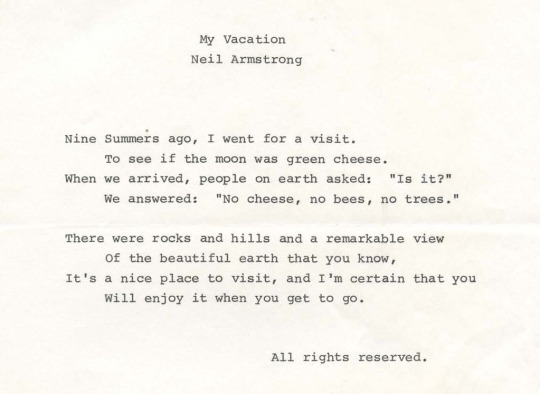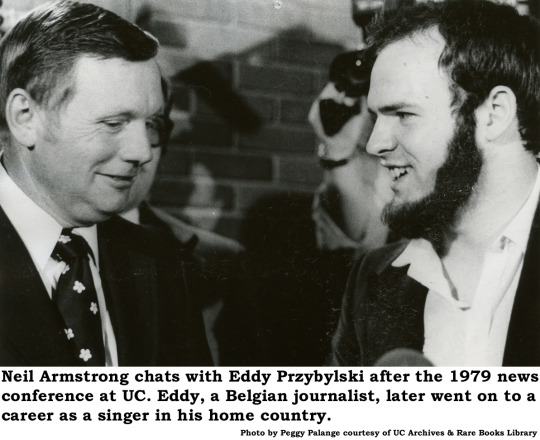#Al Kuettner
Explore tagged Tumblr posts
Text
Remembering The Poetry Of Neil Armstrong
The oeuvre of Neil Armstrong, poet, is slight, consisting as it does of only two published stanzas, and that bit of doggerel clouded by controversy. On the 50th anniversary of the moon landing, here is the story of that poem. Almost all of the participants in this incident are now deceased, so you will just have to trust your proprietor’s memory.
Neil Armstrong’s appointment to the aerospace engineering faculty was quite a coup for the University of Cincinnati, for the city of Cincinnati and for the state of Ohio. Only two years after his voyage to the moon, Armstrong could have written his own ticket anywhere and certainly did at the university, where he negotiated a private secretary and absolute veto power over public appearances and media access.
Managing the public information office at UC through most of Armstrong’s tenure was a veteran United Press International and Cincinnati Post reporter named Al Kuettner, who had spent most of the 1960s covering the civil rights movement. For several years, Kuettner followed Dr. Martin Luther King Jr. from speech to demonstration to assassination. Kuettner wrote a memoir about his civil rights experiences titled “March to a Promised Land.” The book was published in 2006, when its author was 93.
For a hard-bitten old reporter, Kuettner was truly creative at press agentry and came up with many good ideas to promote UC throughout a decade in which the school was lobbying to join the state system of public universities. Some of these ideas involved Neil Armstrong, and the former astronaut almost invariably shot them down.
Kuettner’s secretary was the formidable Claire Young, who had joined the university’s public relations staff a good decade before Kuettner. In fact, Ms. Young (Kuettner, a son of the Old South, always pronounced that honorific as “Mizz” Young), had been hired by UC’s first public relations director and was always ready to help Mr. Kuettner conform to the rules of the office, whether he liked it or not.
Ms. Young also got along famously with Professor Armstrong, who deferred to her on some matters, a fact not lost on Mr. Kuettner, who occasionally called upon Ms. Young to run interference with the celebrity professor. On one occasion in particular, Kuettner discovered that legendary Cincinnati newsman Al Schottelkotte had walked out of an interview with Neil Armstrong’s raincoat, leaving Schottelkotte’s nearly identical raincoat behind. It was Claire Young who sorted out the exchange in a way that left two substantial egos unbruised.
And so, when a request arrived in 1978 for Professor Armstrong to provide a quote or first-person account of his moon landing for the Mini Page, a nationally syndicated children’s section carried in many newspapers, Al Kuettner asked Claire Young to forward the inquiry to Neil Armstrong. Ms. Young explained that the Mini Page was aimed at children and this sold Armstrong on participating. Rather than jotting a few lines of prose, Armstrong penned eight lines of poetry, clearly aimed at a juvenile audience. Here is how they appeared on the Mini Page, as published in the Cincinnati Post [15 July 1978]:

Unfortunately, through an editing error that was never fully explained, the Mini Page deleted two words from Armstrong’s final line. Although the astronaut’s scansion is remarkably (How shall I put this?) . . . not egregious for an engineering professor, the absence of those two words truly screwed up the meter in that last line and Armstrong was wroth.
He fired off a memo to Ms. Young, expressing his outrage that the Mini Page staff had “taken considerable advantage of my good nature,” and that he would never consent to such a request ever again. As it turns out, the Cincinnati Post [14 July 1979] reprinted the entire poem in its original form a year later, as the 10th anniversary of the moon landing neared. Here is the original manuscript of the poem as Armstrong intended it, preserved in the University of Cincinnati Archives:

Claire Young retained all of the correspondence related to this poem. Typical of Armstrong’s UC memoranda, none are signed or initialed. He knew that anything with his signature became an instant collector’s item.
Kuettner prevailed upon Armstrong to participate in a news conference on 11 June 1979 to be held at the now-demolished Faculty Club on the UC campus. Kuettner’s argument to Armstrong was, either he could agree to one hour-long news conference with 80 reporters, or he could endure 80 hour-long interviews. Armstrong agreed. The June date, more than a month before the actual anniversary, allowed the newsweeklies like Time, Newsweek and U.S. News to file copy in advance, and for foreign media to gain closer access than they could at the official NASA news conference in July.
In fact, something like 80 reporters did show up for the news conference, ranging from a representative of Armstrong’s hometown Wapakoneta News to Morton Dean of CBS. A reporter from Belgium rolled out a sleeping bag in Kuettner’s office. Your proprietor, celebrating his first year in the employ of the university, checked credentials at the door and passed out copies of a prepared statement Armstrong made before taking any questions. Essentially, Armstrong bemoaned the doldrums into which the United States space program had fallen and urged the development of a permanent space station, a lunar base and expeditions to other planets.
Once the questions started, Armstrong answered gamely. Someone handed him a copy of Tom Wolfe’s “The Right Stuff.” He flipped through it and said, “No index. It must be fiction.”
The day was quite a success. Kuettner retired at the end of that month. Armstrong left UC a year later. Claire Young retained her role as conscience and institutional memory in the public relations office well into the current century.
Despite the legend, Armstrong was hardly invisible on campus. Like most professors, he spent most of his time in his office or in nearby classrooms, but your proprietor passed him several times on the engineering quad and he always responded cordially to greetings.

14 notes
·
View notes